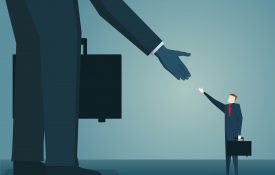-
Blind People Can Echolocate
Smithsonian Magazine: Like bats, some blind people utilize echolocation—bouncing sound waves off objects to locate where they are—as a means of assessing and interacting with their surroundings. To do this, some snap their fingers, while others click their tongues, Health Canal writes. While researchers have known about this skill for years, the degree to which it stands in for vision is poorly understood.
-
Expressing Anger Linked with Better Health in Some Cultures
In the US and many Western countries, people are urged to manage feelings of anger or suffer its ill effects — but new research with participants from the US and Japan suggests that anger may actually be linked with better, not worse, health in certain cultures. The findings are published in Psychological Science, a journal of the Association for Psychological Science. “Many of us in Western societies naively believe that anger is bad for health, and beliefs like these appear to be bolstered by recent scientific findings,” says psychological scientist Shinobu Kitayama of the University of Michigan.
-
For the Thrill of It All
The Wall Street Journal: In the late 1940s, the English adventurer Wilfred Thesiger set out on a series of journeys to explore the vast sand desert known as the Empty Quarter of Arabia. Together with a small band of Arab companions, he suffered multiple hardships, from freezing temperatures at night to intense heat by day—made worse by his decision to travel barefoot—and was haunted by the knowledge that the team was being pursued by bandits. One journey lasted seven months, during which the men were forced to live on vile food and two pints of water a day.
-

Negotiating with Nothing Holds Surprise Benefits
Negotiators are thought to bolster their power when they come to the table with viable alternatives, no matter how weak. But research from an international team of psychological scientists suggests that powerlessness can sometimes be an advantage.
-
Want To Solve The World’s Most Heated Disagreements? Bring Your Wallet
NPR: Conflict between Palestinians and Israelis or Republicans and Democrats appears intractable in part because of one fundamental bias: We misunderstand the other group's motives. When Republicans attack Democrats, Democrats think they're motivated by hate, but Republicans believe they're motivated by love and "in-group" loyalty. And vice versa, of course. Everybody and everything has a price — including empathy. That's according to a study published online in Proceedings of the National Academy of Sciences earlier this year. The research explains why negotiation and compromise sometimes is so difficult, but the also shows that simply getting paid can make people more empathetic.
-
‘Me, Myself, and Us,’ by Brian R. Little
The New York Times: There are two types of people in the world, a wit once said: The type who likes to divide people into two types, and the type who doesn’t. Brian R. Little, author of “Me, Myself, and Us,” is a two-typer. But — and this is at the heart of his endeavor — he believes there are many ways in which people can be divided. So his readers learn that there are “person specialists” and “thing specialists”; “high self-monitors” and “low self-monitors”; “internals” and “externals” (that is, people who locate a sense of control within themselves versus those who follow an outside authority).

